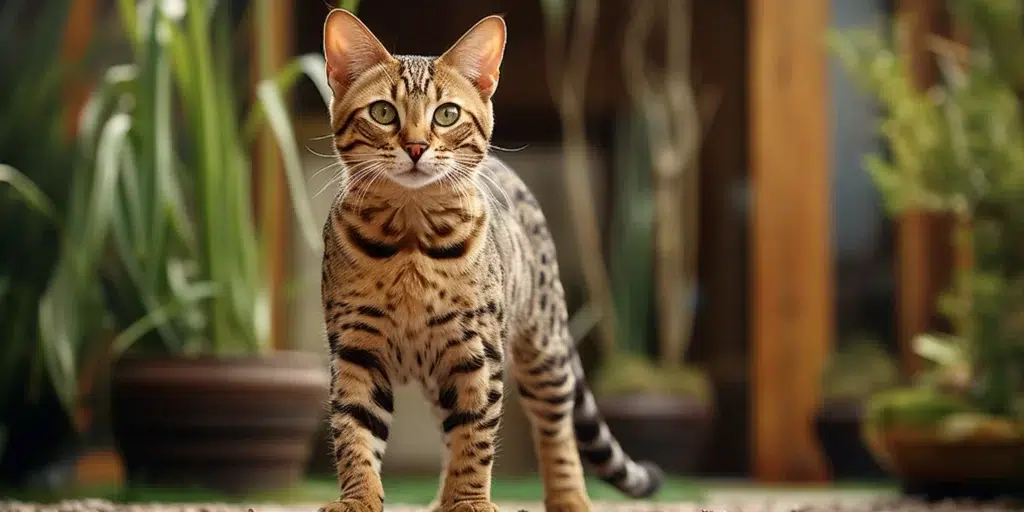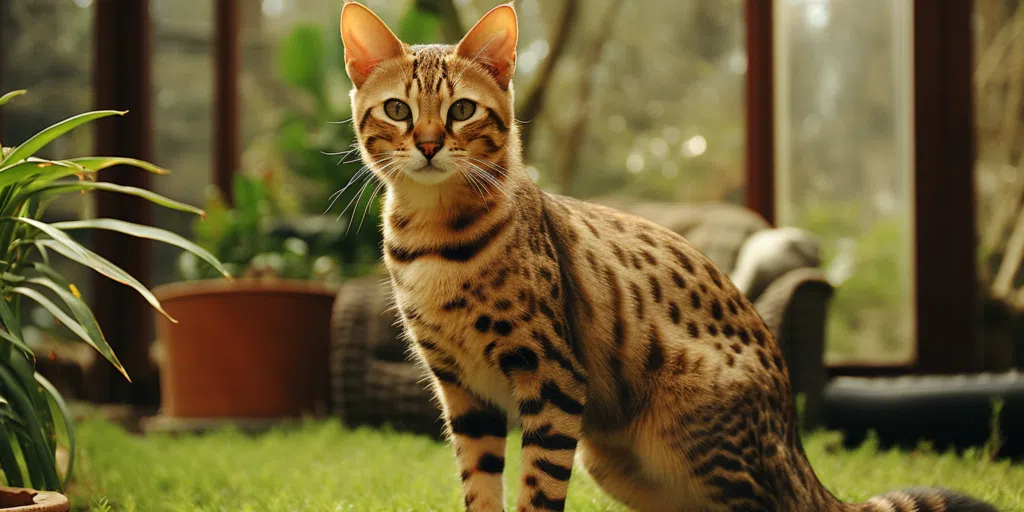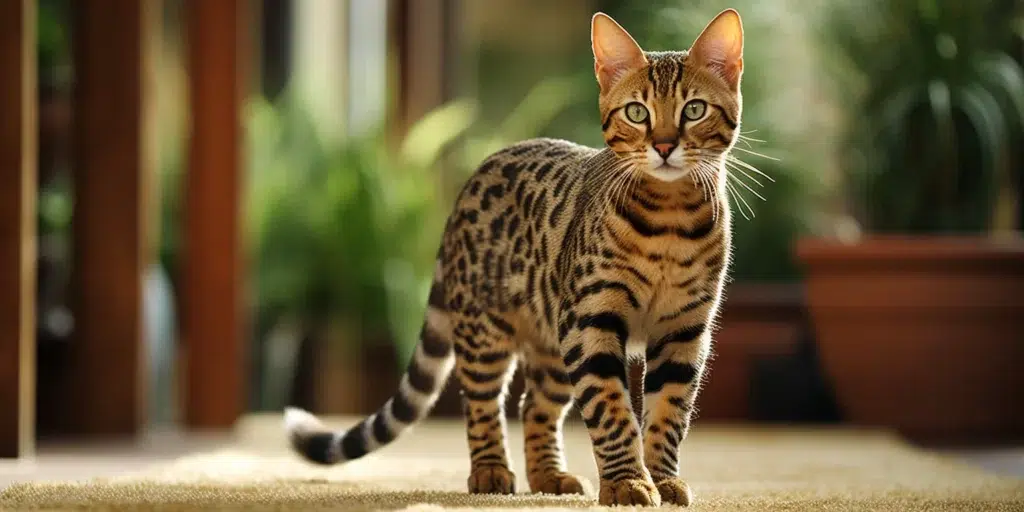When it comes to the astonishing beauty and exotic charm of Savannah cats, prospective pet owners often find themselves pondering the differences between male and female members of this breed. The “Male vs Female Savannah” debate is as intriguing as it is essential for those looking to welcome one of these felines into their home.
It’s not just about the majestic appearance; understanding the nuanced distinctions can help ensure a harmonious fit within a household. This blog aims to dissect the characteristics of both genders, providing you with a detailed comparison so you can make an informed decision.
Choosing between a male and female Savannah cat goes beyond personal preference; it involves considering various aspects such as size, temperament, and care needs that can influence your lifestyle and interactions with your feline companion.
In this comprehensive guide, we will explore each facet associated with “Male vs Female Savannah” cats, delving into their physical attributes, personality traits, and overall health.
Whether you’re a first-time owner or looking to add another furry member to your family, this information will arm you with insights pivotal for a rewarding cat-owning experience.

Visual Differences
| Male | Female | |
|---|---|---|
| Average height (adult): | Taller | Shorter |
| Average weight (adult): | Heavier | Lighter |
| Lifespan: | 12-15 years | 12-15 years |
| Exercise: | High | High |
| Grooming needs: | Moderate | Moderate |
| Family-friendly: | Yes | Yes |
| Other pet-friendly: | Depends on socialization | Depends on socialization |
| Trainability: | High | High |
Male Breed Overview
Male Savannah cats are a marvel within the feline world. Known for their larger stature, they exude a regal presence that can often dominate the room. Physically, males are generally more muscular and have a more pronounced build compared to females.
This robust physique accompanies a highly curious and adventurous spirit. These male characteristics not only contribute to their allure but also play a part in their behavior and temperament.
The personality of a male Savannah can be described as outgoing and assertive. They tend to be more territorial and may exhibit dominance, especially if not neutered. Their playful nature is enduring; they enjoy interactive play sessions and physical activities that stimulate their athletic prowess.
Despite their size and strength, male Savannahs can be quite affectionate and develop strong bonds with their human companions, often seeking attention and companionship.
When it comes to living arrangements, males can adapt well to home environments that provide ample space for exploration and exercise. They have a penchant for higher vantage points and may often be found perched atop shelves or cabinets surveying their territory. Prospective owners should ensure that these cats have enough enrichment to satisfy their intelligence and energy levels.
The adaptability of male Savannahs also extends to their sociability; while naturally confident, early socialization is key to fostering positive interactions with people and other pets.
Training A Male
Trainability is one of the strengths of male Savannah cats. Their intelligence and natural curiosity make them keen learners who can master tricks and follow commands with relative ease.
Early training using positive reinforcement techniques can help male Savannahs understand boundaries and acceptable behaviors. These cats also thrive on interactive play that challenges them mentally, such as puzzle toys or agility exercises.
Consistency is crucial when training a male Savannah, as they can sometimes display a stubborn streak. Establishing a positive training routine early on helps in molding their behavior, ensuring they grow up to be well-mannered adults.
That said, males being naturally larger means they can sometimes unintentionally play rough—training helps in channeling their energy productively.
Health & Care
The health and care of male Savannah cats are paramount. As with any breed, regular veterinary check-ups are essential to detect any potential health concerns early on.
Vaccinations, routine parasite control, and a diet tailored to their size and activity levels will help maintain their overall well-being. It’s also important to pay attention to dental hygiene, as dental issues could become problematic if neglected.
One health consideration unique to males is the risk of developing issues related to their reproductive system if not neutered, such as certain types of cancer or behavioral problems like spraying. Neutering not only reduces these risks but also generally results in a calmer demeanor.
Suitable for:
Male Savannahs are suited for families or individuals who have the time and space to cater to their energetic needs. If you lead an active lifestyle and are looking for an interactive and engaging pet who can join in on adventures, then a male might be ideal for you.
If you appreciate cats with striking appearances and dynamic personalities, the male Savannah will not disappoint.

Female Breed Overview
Female Savannah cats are just as fascinating as their male counterparts, though they often come in somewhat smaller packages. These females usually have slender, delicate frames yet retain the breed’s signature athletic look.
Their grace does not mean that they’re any less robust or adventurous—female Savannahs possess plenty of vigor and enthusiasm.
The demeanor of female Savannahs tends to be somewhat calmer than males, yet they are still full of life and playful spirit. They are affectionate and can form deep bonds with their owners.
Females may be slightly less territorial than males which can sometimes translate into them being more amenable towards other pets; however, this varies between individual cats.
Female Savannahs prioritize places where they can observe while feeling secure, which means that cat trees or wall shelves could become their favored spots in the house.
In terms of living arrangements, they are just as adaptable as males but may require less space due to their slightly smaller size. Nonetheless, they still need plenty of environmental enrichment to keep them mentally stimulated and engaged.
Training A Female
Female Savannahs are intelligent and capable learners who respond well to training sessions that combine physical activity and mental stimulation. They often possess a finesse that makes them quick to pick up on cues and adept at navigating training tasks.
Reward-based training approaches can encourage good habits and obedient behavior in female Savannahs.
Since females may be less dominant than males, some owners might find them slightly easier when it comes to training consistency.
However, it is essential not to underestimate their cleverness or willingness to push boundaries. Female Savannahs appreciate mental challenges just as much as physical ones, so incorporating stimulating activities into the training process is beneficial.
Health & Care
When it comes to health and care for female Savannahs, preventive measures are key to ensuring a long and healthy life. Like males, females also benefit from regular veterinary visits, high-quality diets formulated for active breeds, routine health screenings, and vaccinations.
In addition to general care, reproductive health is an important consideration; spaying helps prevent issues such as mammary cancers and uterine infections.
It’s noteworthy that female Savannah cats may also require additional attention during certain stages of life such as estrus or pregnancy if they are not spayed. Spaying not only mitigates health risks but also eliminates the stress associated with heat cycles.
Suitable for:
Female Savannahs are particularly suitable for homes that appreciate a balance of playful interaction coupled with moments of independence.
They can be excellent companions for those who enjoy the charm of an affectionate yet self-reliant pet. Their somewhat calmer nature might make them appealing to first-time Savannah cat owners who might be uncertain about handling the more intense temperament often displayed by males.
Which One Is Right for You?
Determining whether a male or female Savannah cat will complement your life better largely depends on your personal preferences and lifestyle needs.
While both genders share similar exercise needs, affection levels, involvement in families, social habits regarding other pets, and trainability,
the choice often boils down to space considerations or specific behavioral traits that may align better with your expectations.
Those with ample room who desire an outgoing pet might opt for a male Savannah with his inherent boldness and commanding presence.
Conversely, individuals or families who prefer a slightly smaller cat that may settle into various living situations potentially more easily might find the female counterpart more suitable.

Conclusion
The Male vs Female Savannah debate does not present a clear winner as both genders bring immeasurable joy and exceptional qualities into any household willing to embrace these extraordinary cats. Males might provide a larger-than-life personality wrapped up in awe-inspiring size while females offer the same zest in a slightly more reserved package.
When making your decision on which gender fits your home better, remember that individual personalities can vary enormously within the breed regardless of gender.
Ultimately, it’s essential to interact with the cat beforehand if possible and consider all aspects including visual differences, overview specific to each gender, health considerations, suitability, and training adaptability when making your decision.
No matter the choice between male or female Savannah cats, these impressive creatures promise companionship filled with adventure, love, and excitement.